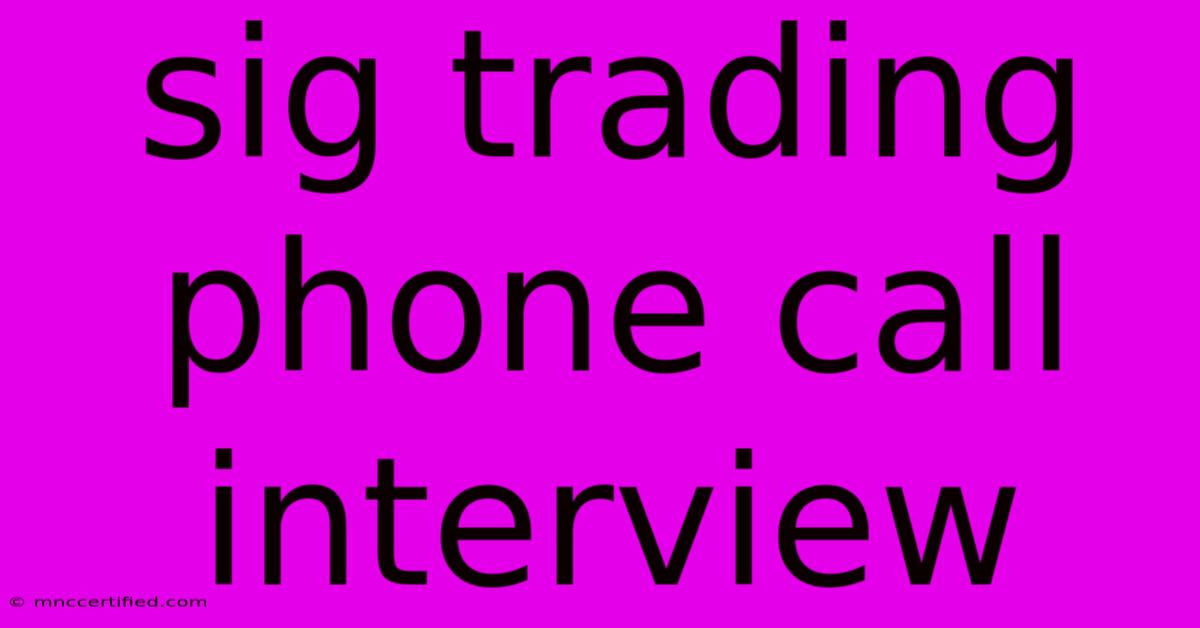Sig Trading Phone Call Interview

Table of Contents
Ace Your SIG Trading Phone Call Interview: A Comprehensive Guide
Landing a phone interview with a prestigious proprietary trading firm (SIG) is a significant achievement. These interviews are notoriously rigorous, designed to assess not only your quantitative skills but also your personality, trading philosophy, and critical thinking abilities. This guide will equip you with the knowledge and strategies to navigate this crucial stage and significantly increase your chances of securing an in-person interview.
Understanding the SIG Trading Interview Process
SIG's interview process is multi-layered, with the phone screen acting as the initial filter. Expect a highly technical conversation focusing on your understanding of:
- Financial Markets: Demonstrate a solid grasp of various asset classes (equities, fixed income, derivatives), market mechanics, and macroeconomic factors.
- Quantitative Skills: Be prepared for brainteasers, probability questions, and potentially some coding challenges (depending on the role).
- Trading Strategies: Articulate your understanding of different trading styles (e.g., arbitrage, market making, statistical arbitrage) and your preferred approach. Be ready to discuss your trading experience, even if it's simulated.
- Risk Management: Showcase your awareness of risk management principles, including position sizing, stop-loss orders, and understanding market volatility.
- Personality and Fit: SIG values intellectual curiosity, a strong work ethic, and the ability to work collaboratively. Your communication skills and overall demeanor will be evaluated throughout the conversation.
Mastering the Technical Aspects: Key Areas to Focus On
Probability and Statistics
Expect questions testing your foundational understanding of probability and statistics. Brush up on concepts like:
- Conditional Probability: Bayes' Theorem and its applications.
- Statistical Distributions: Normal distribution, binomial distribution, and their properties.
- Hypothesis Testing: Understanding p-values and confidence intervals.
- Regression Analysis: Basic linear regression and its interpretation.
Practice solving probability puzzles and review statistical concepts from your coursework or textbooks. Resources like Khan Academy and online probability quizzes can be invaluable.
Financial Markets and Trading Strategies
Your knowledge of financial markets is paramount. Prepare for in-depth questions about:
- Market Microstructure: Understanding order books, bid-ask spreads, and market impact.
- Arbitrage Opportunities: Identify and explain different types of arbitrage (e.g., statistical arbitrage, triangular arbitrage).
- Derivatives: Solid understanding of options, futures, and swaps.
- Specific Trading Strategies: Be ready to discuss your preferred strategies, their advantages and disadvantages, and how you would implement them.
Thoroughly research different trading strategies and be prepared to discuss their nuances and potential pitfalls.
Coding Skills (Depending on the Role)
Some SIG roles may require coding proficiency. While not always a part of the phone screen, be ready to discuss your experience with languages like Python or C++. Be prepared to answer questions about data structures and algorithms.
Beyond the Technical: Personality and Communication
While technical skills are crucial, SIG emphasizes cultural fit. Demonstrate:
- Intellectual Curiosity: Show genuine interest in the markets and a willingness to learn.
- Problem-Solving Skills: Approach questions systematically, outlining your thought process clearly.
- Communication Skills: Articulate your ideas concisely and confidently. Listen attentively to the interviewer's questions.
- Teamwork and Collaboration: Highlight your experience working in team settings, emphasizing your collaborative skills.
Preparing for the Call: A Step-by-Step Approach
- Research SIG: Understand their trading strategies, culture, and values.
- Practice your answers: Prepare for common interview questions, focusing on both technical and behavioral aspects. Use the STAR method (Situation, Task, Action, Result) to structure your answers to behavioral questions.
- Prepare questions to ask: Asking insightful questions demonstrates your interest and engagement.
- Test your technology: Ensure a stable internet connection and a quiet environment.
- Dress professionally: Even though it's a phone call, dressing professionally can enhance your confidence and focus.
Example Questions and How to Approach Them
- "Walk me through your trading experience." Use the STAR method, highlighting your decision-making process, risk management, and results.
- "Explain a time you made a significant trading mistake." Focus on what you learned from the mistake and how you improved your approach.
- "What are your strengths and weaknesses?" Be honest and self-aware. Frame weaknesses as areas for improvement.
- "Why are you interested in working at SIG?" Show your genuine interest in their specific trading strategies and culture.
Conclusion: Increase Your Chances of Success
The SIG trading phone interview is a challenging but surmountable hurdle. By focusing on both the technical and behavioral aspects, mastering your communication skills, and preparing thoroughly, you can significantly increase your chances of progressing to the next stage of the interview process. Remember, demonstrating a passion for trading, a strong work ethic, and a collaborative spirit are key to making a lasting impression. Good luck!

Thank you for visiting our website wich cover about Sig Trading Phone Call Interview. We hope the information provided has been useful to you. Feel free to contact us if you have any questions or need further assistance. See you next time and dont miss to bookmark.
Featured Posts
-
Insurance Claim Denial Attorneys
Nov 22, 2024
-
Armed Police At Us Embassy London Incident
Nov 22, 2024
-
Maura Higgins And Shane Mc Guigan Dating History
Nov 22, 2024
-
Warrior Trading Plain Truth Book
Nov 22, 2024
-
Seventh Eruption Icelandic Volcano
Nov 22, 2024